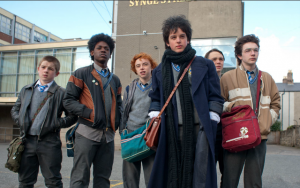SING STREET: 4 STARS. “a story that is as joyful as it is tuneful.”
 Ask any male musician why they joined a band and 99 out of 100 will tell you it was for one very simple reason. To meet girls. Art, money and fame are often far distant second place to the lure of the opposite sex. Such is the case with Conor (Ferdia Walsh-Peelo) a fifteen-year-old school by with a crush on Raphina (Lucy Boynton) in the new musical romance “Sing Street” from director John Carney.
Ask any male musician why they joined a band and 99 out of 100 will tell you it was for one very simple reason. To meet girls. Art, money and fame are often far distant second place to the lure of the opposite sex. Such is the case with Conor (Ferdia Walsh-Peelo) a fifteen-year-old school by with a crush on Raphina (Lucy Boynton) in the new musical romance “Sing Street” from director John Carney.
Fuelled by jittery new wave music, this Dublin set coming-of-age story is a crowd pleaser. The year is 1985 and Conor is a fifteen-year-old student at Synge Street Catholic School. Leaving the tyrannical Brother Baxter (Don Wycherley) behind one day he lays eyes on Raphina, a teen dream with a perm and aspirations to be a model in London.
In a clumsy attempt to impress her he asks if she’d like to perform in his band’s new video. Trouble is, he doesn’t have a band. Not yet, anyway. Enlisting manager Darren (Ben Carolan) and musicians Eammon (Mark McKenna), Ngig (Percy Chamburuka) among others, he forms a band, writes songs and works to win Raphina’s heart. ‘
With the help of his older brother, stoner Brendan (Jack Reynor), who tells him, “Rock and roll is a risk… you risk being ridiculed,” Conor changes his name to Cosmo and slowly finds his sound. The songs are crafted from his experience—his mom and dad’s martial troubles, the prissy priest who torments him and, of course, his lady love in “The Riddle of the Model”—and are catchy enough to impress audiences and maybe even Raphina.
Call “Sting Street” a neo “The Commitments” if you like—the two have much in a common, a strong soundtrack, a scrappy Dublin setting, a charming cast of unknowns—but the story of music’s power to change and uplift lives is a potent one. Director John Carney says the story is partially autobiographical and his personal touch elevates what could have been a run-of-the-mill rite-of-passage/dream girl story. Walsh-Peelo and Boynton are appealing central characters (even if the other band members are underwritten) but it is the music that binds it all together. Like Carney’s other films, “Once” and “Begin Again,” the tunes and Carney’s deft handling of them, work as more than just a soundtrack. They are the lifeblood of his stories, the thing that makes them special.
In one bravura fantasy sequence Cosmo imagines his video for “Drive It Like You Stole It” as an elaborate restaging of the prom scene in “Back to the Future,” complete with choreography and 1950s costumes. Instead of simply being a flash set piece, Carney works in all of Conor’s issues into the visuals, entertaining the eye and furthering the story.
There isn’t a cynical bone in “Sing Street’s” body. It celebrates risk taking and underdogs in a story that is as joyful as it is tuneful.
